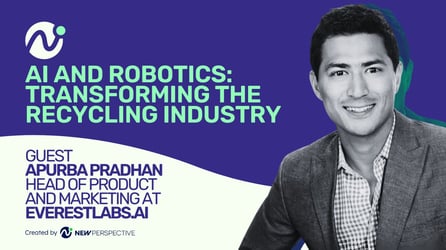Want To Sell Smarter? Borrow This Manufacturer's Playbook
Methods Machine Tools is not your average manufacturer. Founded in 1958 and still family-owned, the company has quietly shaped the arc of modern American industry. It was the first U.S. importer of Japanese CNC machines, among the earliest adopters of five-axis machining in the ’90s, and a pioneer of automation in the 2000s—at a time when the word itself sparked fear on the factory floor.
Today, with 350 employees across seven U.S. locations, Methods remains a crucial node in the ecosystem of advanced manufacturing: selling not just machines, but also the automation and engineering support that keep the supply chain humming.
They discuss the sector’s digital awakening, the intergenerational handoff underway in machine shops across America, and why adopting smart tech is no longer a luxury but a business imperative.
Interview with Jon Star
Dunya Jovanovic: Can you start by telling us about your role at Methods Machine and what the company stands for in American manufacturing?
Jon Star: I’m Jon Star, Director of Marketing at Methods Machine Tools, based just outside Boston. We’re a third-generation, family-owned business with about 350 employees. We import CNC machine tools and provide automation services. That means if you're fabricating parts, whether it’s a car component or a faucet, we sell the machines and offer the technical support that makes manufacturing happen. We’ve been in business since 1958 and operate across seven U.S. offices, with customers in the U.S., Canada, and Mexico.
Jovanovic: From your perspective, what’s the state of U.S. manufacturing? What’s changing?
Star: It’s a pivotal moment. Coming from enterprise tech, I entered this industry at a fascinating time. Beyond the familiar macro trends like tariffs and reshoring, deeper structural shifts are underway. Manufacturing is capital-intensive and highly competitive. There are three big challenges: an aging labor force, disruptive technologies, and thin profit margins. The industry is trying to catch up to the digital transformations that other sectors underwent 10 to 15 years ago.
Jovanovic: Why did manufacturing miss the first wave of digital transformation?
Star: Digital transformation as a concept took off around 2011 or 2012. But the focus was on services, enhancing the consumer experience, or streamlining internal business operations. Manufacturing didn’t fit that narrative. The focus was on making parts and maintaining quality. Plus, a lot of manufacturers are small to mid-sized businesses that didn’t view tech investment as urgent. Now, with generational shifts and competitive pressure, it's clear: adopting tech is a strategic advantage.
Jovanovic: Methods was the first U.S. importer of Japanese CNC tools. How does that legacy shape your current approach?
Star: Innovation is in our DNA. Our founder was the first to import Japanese CNC tools in the late '50s. We led with five-axis machining in the '90s and embraced automation in the 2000s—even when people feared it would replace workers. Now, we’re piloting AI tools internally, not just for efficiency but to reimagine how we operate.
Jovanovic: What are you learning from that AI pilot?
Star: Unexpectedly, some of our longest-serving employees were the first to embrace it. That’s been encouraging. But we’ve also learned how crucial it is to manage information properly. Manufacturing involves sensitive, often proprietary work. You need strict guardrails. And with the incoming workforce, who are digital natives, the expectation is that tech will already be part of the job. Companies that don’t adopt AI will struggle to recruit and retain talent.
Jovanovic: What does talent development look like at Methods?
Star: It’s cross-departmental and highly intentional. Communication is key. We work with vocational and engineering schools, co-sponsor career fairs, and make clear that manufacturing careers include more than just shop-floor engineering. There are sales, finance, and tech services. We’re also battling outdated perceptions—not just among students but parents, who may not see manufacturing as a viable path. But the work is energizing. You’re making real things.
Jovanovic: How do you make AI and automation feel tangible to customers?
Star: Storytelling and proof. We run internal focus groups, communicate results across teams, and start pilots in customer-facing departments like our National Technical Service Desk. For example, what if a service tech could resolve an issue in 30 minutes instead of two hours using our AI tool? That gets attention. We even humanized our automation campaign—no machine specs, just personalities and relatable use cases. It’s about making the value real.
Jovanovic: Are your buyers still thinking analog, or is that changing?
Star: Both. You might have a shop owner who wants to hold a brochure, but younger team members are learning via TikTok. And those people influence buying decisions. Our challenge is to speak to both.
Jovanovic: Even future-tech companies are still doing physical events. Is that true for you, too?
Star: Absolutely. We've digitized our CRMs and marketing platforms, but we still host in-person events. Our customers want to see machines run and even hear them. It’s not just specs; it’s sensory.
Jovanovic: Where does marketing and sales alignment typically break down?
Star: When we lose the voice of the customer. Field sales reps hear things daily that I don’t at headquarters. One throwaway comment could be the golden line for a campaign. We need that feedback loop. Ultimately, I’m here to support sales, to be wind in their sails.
Jovanovic: Your sales cycle is long. How do you nurture trust over time?
Star: Data is key. Every valid touchpoint counts: a site visit, a content download. We use content like videos, service metrics, and customer stories to move people from lukewarm interest to intent. And we arm our sales team with what they need to close the loop.
Jovanovic: Do you adjust your marketing strategies for different partners?
Star: Yes. As importers, we represent multiple brands with different technologies and audiences. We market each accordingly. But the umbrella is always the Methods brand. Manufacturing is an ecosystem where even competitors collaborate at times. There's room for everyone.
Jovanovic: How do you know what's working?
Star: We track everything—traffic from YouTube, QR codes, form fills. It’s about connecting digital breadcrumbs and constantly evaluating what gets the most attention.
Jovanovic: What role does smart tech play in sustainability?
Star: It preserves institutional knowledge. Manufacturing has long relied on tribal memory. When someone leaves, so does their know-how. With a solid tech stack and AI tools, you can create a resilient digital footprint. That’s huge for small and mid-sized firms.
Jovanovic: What gives you hope for the future?
Star: Opportunity. This industry is hungry for talent. If you're young and ambitious, manufacturing offers real career impact. Tech adoption isn’t a “nice-to-have” anymore—it’s a business imperative. And with tools like AI, I think we’re about to see a leap. The future of this industry will be digital, but also deeply human.
Jovanovic: Final question. What would you say to marketers entering manufacturing?
Star: Be bold. There’s so much room for creativity. This industry needs storytellers, designers, and communicators. Bring your skills and your AI tools. There's room for building an interesting career here.
👉 Episode Resources:
- Website: https://www.methodsmachine.com/
- LinkedIn: https://www.linkedin.com/company/methods-machine-tools
🎧 Subscribe to our podcast
💬 Follow GNP on Social



